
New scientific research suggests that the negative effects of trauma can be inherited. Fathers may actually transfer the consequences of their early experiences to their children via an epigenetic process. Researchers report that mice that experienced stress early on passed down the negative consequences – depression, underestimation of risk, and upset of metabolism – to their offspring, even if their offspring were not directly exposed to stress or trauma.
In a recent study, Isabelle Mansuy and her colleagues at the University of Zurich, Switzerland periodically removed mother mice from their babies, engaging the mothers in traumatic situations by physically restraining them or placing them in cold water in order to induce stress. Because the mothers were removed from their pups at random times every day, the mothers couldn’t nurture their babies in preparation for these traumatic experiences and, as a result, the pups grew up displaying depressive symptoms. This was expected.
But researchers also found an abnormal increase in five different microRNAs in the sperm of the male pups, termed the F1 generation. MicroRNAs are pieces of RNA which prevent the production of proteins and play a key role in genetic expression. One particular microRNA that was elevated, MiR-375, is thought to be linked to stress and metabolic regulation.
When the F1 pups had offspring, these pups (F2) displayed the same depressive behaviors and disrupted glucose metabolism as their parents (spoiler alert: so did THEIR offspring, F3). The behavioral consequences of being stressed out and depressed from mom’s absence, as well as the abnormal rise in the same five microRNAs was thought to be epigenetically transferred from the father to the F2 and F3 offspring, despite the subsequent generations being raised normally without any trauma.
In F1 and F2 mice, the increase of five microRNAs was found in their blood and hippocampus, an area of the brain crucial to the major stress-regulating axis of the body. Depressive behaviors were present in all offspring studied, suggesting that individual traumatic experiences may actually be inherited from the father, though researchers continue to explore the exact mechanisms by which this occurs.
Taking the study even further, Mansuy and her colleagues wanted to ensure these behaviors weren’t passed down socially – that is, the offspring did not just happen to pick up on the depressed actions, indicating that there might not have been any inherited stress-causing epigenetic marks after all. To do this, researchers injected RNA from the F1 males’ sperm into recently fertilized eggs from non-traumatized mice, finding that the same depressive behaviors and metabolic alterations persisted. Clearly, the behaviors weren’t learned – they were likely passed down in the sperm through what are referred to as epigenetic marks, or chemical modifications that change the expression of DNA without altering its sequence.
However, the exact biological mechanisms underpinning the increase in sperm microRNAs are not yet clear. Researchers indicate some possibilities as to how these epigenetic marks and resulting behavioral and metabolic disruptions may be transferred to the offspring, including DNA methylation or chemical modifications to histones. This research is also putting attention on the father and his epigenome, showing that behavioral changes as a result of trauma experienced by the father can indeed be inherited in mice. What is perhaps most fascinating is the potential to find similar biomarkers in humans. This could give us the ability to determine if increases in, for example, a certain type of microRNA can predict whether someone may suffer from stress or develop psychiatric disorders later in life.
Source: Learn all about it and read more about their findings here: Gapp, K., et al. Implication of sperm RNAs in transgenerational inheritance of the effects of early trauma in mice. Nat Neurosci, (2014).


